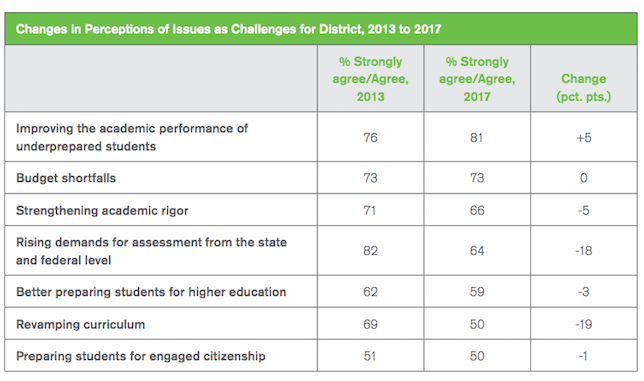Superintendents Say Finding Quality Educators is a Major K–12 Challenge
Many superintendents value teachers and principals who create excitement about the future and say this quality is “extremely important” for preparing students to succeed in school and beyond. However, finding enough quality educators is sometimes difficult to do, as cited by two out of three superintendents polled in a recent survey who believe that the quality of new teacher and principal candidates in their district is declining.
Gallup conducted an online survey of hundreds of district superintendents for the “Gallup 2017 Survey of K–12 School District Superintendents,” which reports their opinions on important topics and policy issues facing education.

The only issue superintendents are more likely to perceive as a greater challenge this year than in 2013 is improving the
academic performance of underprepared students. Image: Gallup.
As expected, the poll found that the academic performance of underprepared students remained a top concern — even more so compared to the last survey conducted in 2013. Eighty-one percent of superintendents "strongly agree" that improving the academic performance of underprepared students is a challenge, compared to 76 percent four years ago. Budget shortfalls are still a challenge for districts as well (cited by 73 percent of respondents both years).
Meanwhile, state and federal assessment now ranks only as a mid-level concern, with about two-thirds of respondents expressing these demands would be a challenge.
On another positive note, districts are having less difficulty with updating curriculum. Around 69 percent of superintendents said revamping curriculum was a major challenge in the previous survey, but only 50 percent answered the same this year.
Superintendents are rather concerned by the shortage of teachers and principals willing to design strategies for students’ long-term success. “Among various strategies or initiatives designed to foster student success after graduation, superintendents are most likely to rate having teachers who create excitement for the future as extremely important to achieving that end,” according to the report of findings. They prefer candidates who can teach a rigorous academic core, even in early education.
Two-thirds of respondents said they have positive relations with their school board, but a sizeable amount do not: Close to one in five superintendents have considered leaving their role as a result of their school board. Earlier this week, for example, K–12 Alabama Superintendent Michael Sentance resigned after months of battling with state board of education members, Alabama Local News reported.
Their opinion of the federal government’s role in education, however, is even less favorable. “Superintendents acknowledge that federal education policy affects their district, but they remain negative about the job the federal government has done in this area in the last five years,” the report stated. “It is unlikely that those views will change under the new Donald Trump administration, since a majority of superintendents say they have no confidence at all in the Trump administration to handle K–12 education policy.”
These reasons may be why many superintendents are losing value their work: Forty-two percent said they are engaged in their job, while 52 percent are not engaged. Gallup defines “engaged workers” as those that tend to be more productive, psychologically committed and emotionally connected to their role. The survey found that the district’s location in which they work may impact superintendent engagement, with 58 percent of superintendents in urban areas saying they are engaged compared to 36 percent in rural areas.
To dive further into the survey findings, visit the Gallup site for the full report (free with registration.)
Updated on Sept. 14 at 1:50 p.m. to include more information.
About the Author
Sri Ravipati is Web producer for THE Journal and Campus Technology. She can be reached at [email protected].